Global Research Agenda
The Global Research Agenda
Overview
The research agenda has three levels (Figure 3):
- Cross cutting all levels: Foundational research themes needed to inform all climate and mental health research. All research in this field can contribute to iteratively building the knowledge base for these foundational themes.
- Level 1: High-level research categories of critical need for knowledge generation in climate and mental health globally (see Appendix 3 for details on how these were developed). These cover:
- Impacts of climate change on mental health, and factors that may increase risk for or be protective against these impacts: The nature of the effects of climate change on mental health, including which mental health challenges are worsened or at increased risk of developing, the prevalence, severity, economic and societal cost of these impacts, and what factors may increase the risk of or be protective against these impacts.
- Pathways and mechanisms: How climate change affects mental health through psychological, social, cultural, environmental, behavioural, biological, political and commercial pathways and mechanisms.
- Mental health benefits and risks of climate action: The benefits and risks to mental health of actions across sectors to reduce the impact of climate change on human or natural systems; such actions may include a combination of both mitigation and adaptation.
- Mental health interventions in the context of climate change: Interventions, strategies, tools, resources, policies, practices or approaches to support mental health within the context of climate change. This includes providing support to people already experiencing climate change-related mental health challenges, and reducing the risk or severity of future negative mental health impacts (prevention).
- Level 2: Priority research topics that provide concise summaries of key areas of research within each high-level category.
- Level 3: Priority research questions, with illustrative examples.
While the research agenda presents distinct foundational themes, categories, topics and questions, these are interconnected. For example, building understanding of the biological mechanisms through which climate change impacts mental health must also consider the social and environmental context in which an individual lives. Understanding how climate change impacts mental health must be coupled with assessing how actions to respond to these impacts can target these pathways and mechanisms.
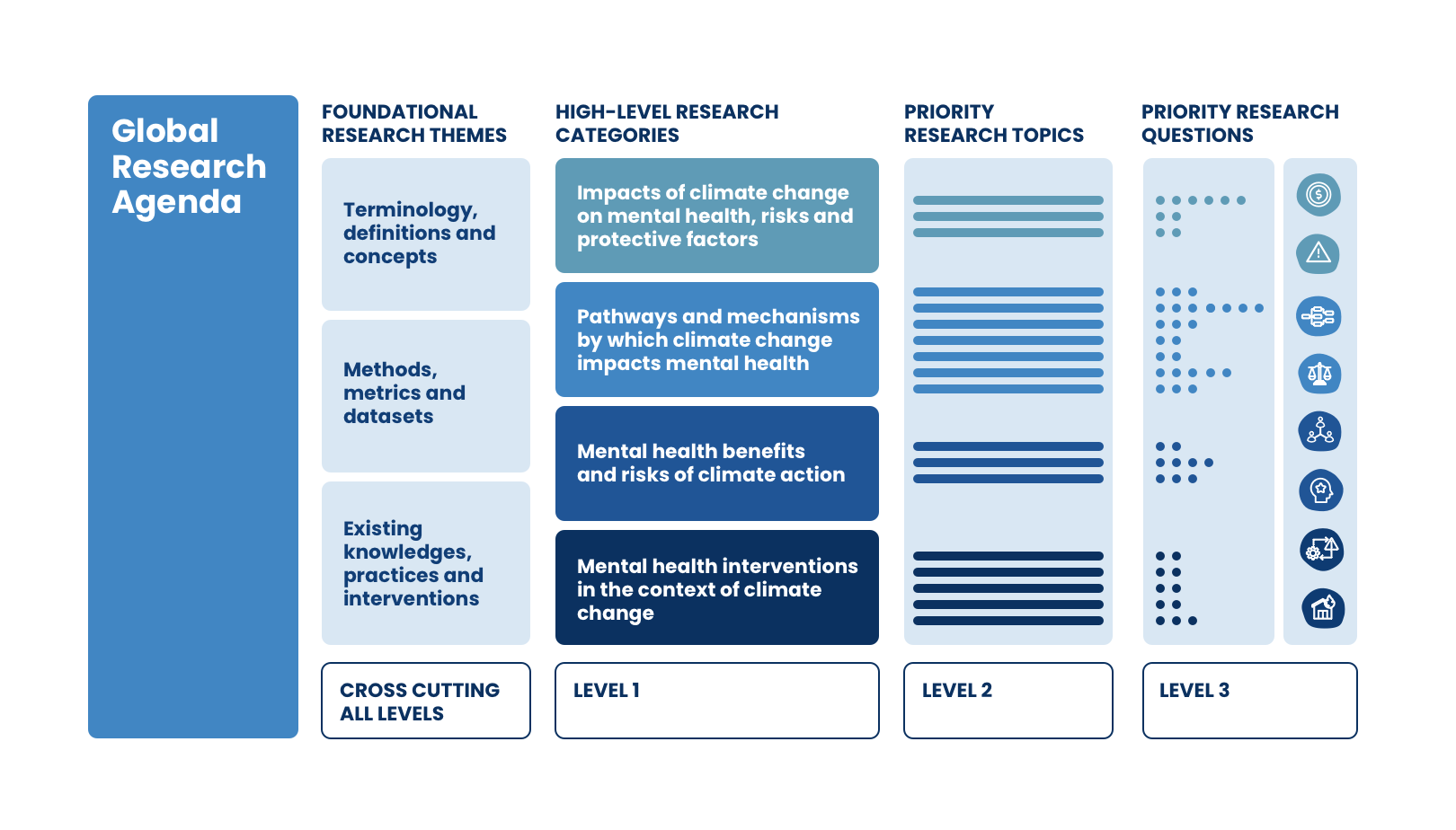 Figure 3: Overview of the global research agenda.
Figure 3: Overview of the global research agenda.

Foundational research themes
Three themes underpin all of the global research categories, topics and questions (Box 1). Building this foundational understanding is critical to establishing an aligned, inclusive and transdisciplinary climate and mental health field. It must be done in inclusive and appropriate ways that acknowledge and value the diversity of understandings and experiences surrounding climate change and mental health.
| Box 1: Foundational research themes |
|---|
| 0.1 Developing terminology, language, definitions and concepts for climate and mental health to inform standardised research, measurement and shared understandings across disciplines and settings, while acknowledging that terms are conceptualised in diverse ways across geographies and cultures. For example: What frameworks need to be developed to consistently and appropriately measure climate change-related mental health challenges, globally and in diverse contexts? This includes identifying relevant key climate hazards and mental health outcomes, and pathways and mechanisms of impact. How can transdisciplinary working and knowledge-sharing enable both 1) standardised climate and mental health research and shared understandings, and 2) different knowledge and perspectives to coexist and be equally valued? How should climate anxiety be conceptualised and measured, including its relationship to different psychological responses to climate change (e.g. climate worry) and to other known forms of anxiety, while ensuring relevance across cultures and contexts? |
| 0.2 Identifying and developing research methods, metrics and datasets to identify, understand and evaluate the mental health impacts of climate change, climate actions, and climate change-related mental health support. For example: What mental health indicators should be tracked globally, regionally and nationally to monitor the mental health impacts of climate change and benefits of climate action? How can these indicators be integrated into existing monitoring systems (e.g. the Lancet Countdown on health and climate change)? For which indicators is data currently available for reporting, and what data is needed to develop future indicators? What methods and metrics are needed to attribute mental health challenges to climate change, and when is such attribution feasible, useful and appropriate? What are key indicators of success in the climate and mental health research field? Indicators could include: papers published in the Global South, inclusion of mental health in relevant climate policies (e.g. National Adaptation Plans), funding for climate and mental health research, community-led research. |
| 0.3 Identifying and evaluating existing knowledge, practices, interventions and solutions to understand and respond to the mental health impacts of climate change, including the expertise of those with lived experiences. For example: How can traditional and Indigenous knowledge inform coping strategies that protect mental health, such as in response to climate change-related loss of land, culture or livelihoods? What can climate and mental health learn from other research fields? What existing evidence-based therapeutic approaches to reduce psychological distress, symptoms of mental health challenges and support psychological resilience are most relevant to the context of climate change? |


High-level research categories, priority research topics and questions
Featured top priority research questions
The global research agenda contains 53 research questions. Using an online survey, 74 global experts across sectors and disciplines selected their ‘top’ priority questions; Figure 4 indicates the two research questions that were most often chosen, for each high level research category. Despite the global distribution of this prioritisation survey, almost half of respondents were based in Europe and Northern America. Readers should bear in mind this regional bias.
Further details on the survey and regional data can be found in Appendix 4, including a weighted analysis that accounts for regional bias in survey responses.
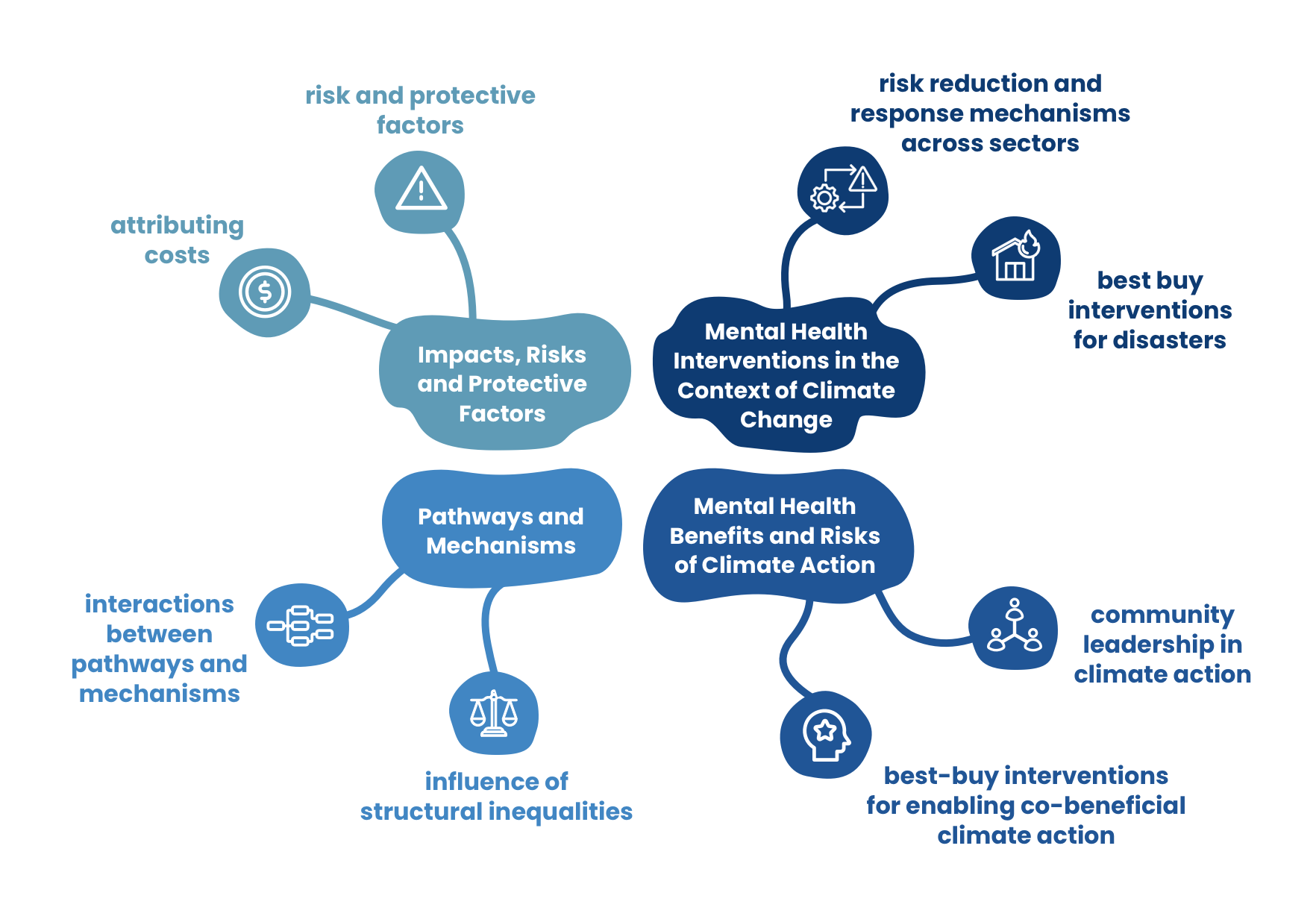 Figure 4: Top two research questions for each high-level research category
Figure 4: Top two research questions for each high-level research category
As well as these top priority research questions, surprising research topics and questions emerged through the CCM dialogues that are not yet commonplace in the existing climate and mental health literature. For example, the mental health impacts of social isolation enforced by extreme heat was mentioned independently throughout multiple dialogues in different regions.
Research topics or questions that stood out to experts who took the survey as particularly interesting, surprising or novel are listed below. Regions where experts who raised each point are based are also listed.
- The emphasis on research that could quickly lead to improved policies, such as identifying best buy interventions, measuring effectiveness of interventions, and understanding costs (Latin America and the Caribbean; Europe and Northern America).
- The emphasis on pathways and mechanisms (as a less studied area within the climate and mental health field to date), particularly their complexity and interconnectedness (Latin America and the Caribbean; Sub-Saharan Africa; Europe and Northern America).
- The importance of learning from Indigenous knowledge, such as Indigenous methods of coping with the impacts of climate change (Sub-Saharan Africa).
- Understudied but potentially high impact research areas such as transgenerational and/or epigenetic effects (Europe and Northern America).
- The potential for this research to influence large numbers of people with lived experience, such as by understanding relationships between climate impacts and psychotropic medications (Europe and Northern America).



Tables 1-4 present all the research topics and questions within each high-level category. Research topics are listed in descending order, based on the average frequency of occurrence across the ten regional and lived experience agendas. Within each topic, the research questions are also listed in descending order of how frequently they appeared in the ten agendas (see Appendix 5).
High-Level Research Category One: Impacts of climate change on mental health, and factors that may increase risk for or be protective against these impacts
| Table 1: Priority research topics and questions within high-level research category one | |
|---|---|
| Priority Research Topic | Priority Research Questions |
| 1.1 Risk and protective factors for climate change-related impacts on mental health challenges | 1.1.1 Risk and protective factors: What factors increase or reduce the risk of climate change-related impacts on mental health challenges? Which factors are unique to the context of climate change, and/or what known risk and protective factors for mental health challenges are compounded by climate change? This includes environmental, social, cultural, economic, commercial, psychological, behavioural and biological factors (e.g. living with pre-existing mental health challenges, gender, age, livelihood, colonialism, early intervention, among others).  |
| 1.2 Impacts of climate change on mental health challenges **Note: Assessing "impact" can encompass examining current and predicted climate change-related alterations to the nature, severity, incidence, prevalence and additional burden of mental health challenges; examining the attribution of these effects to human-induced climate change; and identifying mental health challenges that are novel to climate change. | 1.2.1 Extreme weather and climate events: What is the impact** of different types of climate change-related extreme weather and climate events on mental health challenges (including compounding impacts caused by repeated, chronic, and/or different simultaneous or sequential events)? |
| 1.2.2 Disruptions to determinants: What is the impact on mental health challenges of climate change-related disruptions to the conditions that foster good mental health ('determinants')? This includes: forced migration; conflict; food insecurity; water, sanitation and hygiene insecurity; disruptions to education, livelihoods and social connectedness, disruption to nature connectedness and biodiversity, and lack of access to healthcare or cultural, community and spiritual practices, among other disruptions. | |
| 1.2.3 Climate change-related awareness and perceptions: What is the impact on mental health challenges of psychological responses to awareness or perceptions of climate change and insufficient climate action, and/or fear of future climate change-related impacts, and what is the threshold at which such psychological responses (e.g. distress) disrupt daily functioning and can become a mental health challenge or compound pre-existing mental health challenges? | |
| 1.2.4 Cumulative impacts: What is the cumulative impact on mental health challenges of directly experiencing extreme weather and climate events, and/or disruptions to the conditions that foster good mental health, and/or climate change-related psychological distress (e.g. about climate awareness, insufficient climate action, and/or fear of future extreme weather and climate events)? This includes the context of repeated climate impacts and their psychological consequences causing cycles of disruption. | |
| 1.2.5 Long-term impacts: What are the long term impacts to mental health challenges of experiencing extreme weather and climate events, and/or of experiencing climate change-related disruptions to the conditions that foster good mental health ('determinants')?vi | |
| 1.2.6 Transgenerational impacts: What transgenerational impacts on mental health challenges in offspring may result from climate change-related experiences of the parents during the preconception period and perinatal development (i.e. before, during, after birth)? | |
| 1.3 Assessing costs of climate change-related impacts on mental health challenges | 1.3.1 Attributing costs: What current and future economic, social, cultural and physical health costs are attributable to climate change-related impacts on mental health challenges, including the increased burden due to new cases or worsened symptoms?  |
Some of these research questions have been more thoroughly researched than others (e.g. understanding the impact of extreme weather and climate events on mental health),26 although not for all relevant groups, events, outcomes and settings. Others remain minimally studied, such as protective factors against these impacts, longitudinal research on long-term impacts, and quantification of economic and societal costs20,44. Climate and mental health research has disproportionately been conducted in high income countries26, so future research must ensure geographical coverage that is more representative of the world’s population.
High-Level Research Category Two: Pathways and Mechanisms
| Table 2: Priority research topics and questions within high-level research category two | |
|---|---|
| Priority Research Topic | Priority Research Questions |
| 2.1 Psychological and cognitive pathways and mechanisms | 2.1.1 Psychological responses to climate awareness: How are mental health challenges affected by psychological responses to climate change-related perceptions, awareness, trust of information, communication and narratives, and their interaction with other psychological traits? E.g. Does low tolerance for uncertainty lead to poorer mental health outcomes in the context of climate distress? |
| 2.1.2 Cognitive and affective changes: How are mental health challenges affected by climate change-induced cognitive problems and/or affective (mood/emotional) changes? E.g. heat-induced changes to memory, attention, irritability or aggression. | |
| 2.2 Social and cultural pathways and mechanisms | 2.2.1 Breakdown of interpersonal relationships: How are mental health challenges affected by climate change-related breakdown of interpersonal relationships, social connection and community cohesion? E.g. deaths in communities due to extreme weather and climate events, interpersonal and domestic conflict, gender based violence. |
| 2.2.2 Disruption to living and working conditions: How are mental health challenges affected by climate change-related disruption to living and working conditions such as education, livelihoods, health systems and access to care? | |
| 2.2.3 Disruptions to culture and identity: How are mental health challenges affected by climate change-related disruptions to culture, identity, community, spiritual practices and relationships with nature? E.g. loss of traditional lands and historic memory. | |
| 2.2.4 Influence of mental health stigma: How are climate change-related mental health challenges compounded by mental health stigma, discrimination and cultural perceptions? | |
| 2.2.5 Climate change-related displacement and migration: How are mental health challenges affected by climate change-related forced and chosen migration, relocation and displacement? | |
| 2.2.6 Climate change-related careers: How are mental health challenges affected by participation in climate change-related careers, governance and decision-making? This includes impacts of being excluded or underrepresented in climate decision-making, as well as involvement in psychologically difficult work. | |
2.2.7 Influence of structural inequalities: How are climate change-related mental health challenges compounded by historic and current structural inequalities, inequities and colonialism?  | |
| 2.2.8 Influence of other crises: How are climate change-related mental health challenges compounded by previous and/or ongoing crises? E.g. pandemics, economic crises and conflict. | |
| 2.3 Environmental pathways and mechanisms | 2.3.1 Food, water and sanitation insecurity: How are mental health challenges affected by climate change-related food insecurity and water, sanitation and hygiene insecurity? |
| 2.3.2 Disruption to natural environments: How are mental health challenges affected by climate change-related disruption to natural environments? E.g. impacts of reduced access to green or blue space or biodiversity loss. | |
| 2.3.3 Disruption to built environments: How are mental health challenges affected by climate change-related disruption to built environments, including indoor and outdoor conditions? E.g. indoor air temperatures in homes and workplaces, worsened air quality due to heat and humidity or wildfire smoke, climate change-related infrastructural damage. | |
| 2.4 Behavioural pathways and mechanisms | 2.4.1 Disruptions to sleep: How are mental health challenges affected by climate change-related disruptions to sleep? E.g. during periods of extreme heat or anomalously high temperatures. |
| 2.4.2 Climate change-imposed behaviour changes: How are mental health challenges affected by climate change-imposed behaviour changes? E.g. reduced physical activity or imposed social isolation during extreme heat. | |
| 2.5 Biological and pharmacological pathways and mechanisms | 2.5.1 Climate change-related physical health impacts: How are mental health challenges affected by climate change-related impacts on physical health? E.g. climate change-induced malnutrition, safe water scarcity/dehydration or increased spread of infectious disease. |
| 2.5.2 Hormonal and/or physiological changes: How are mental health challenges affected by climate change-related impacts on hormonal and/or physiological pathways and mechanisms? E.g. the effect of climate change-related stress on cortisol levels, changes in blood flow with higher temperatures, changes to gut bacteria or increases in chronic inflammation. | |
| 2.5.3 Neurobiological changes: How are mental health challenges affected by climate change-related impacts on neurobiological pathways and mechanisms, including known impacts of climate change on the brain? E.g. related to neurochemical changes, potential changes in blood brain barrier permeability, neuroimmunity, circadian rhythm, and other structural and functional brain changes. | |
| 2.5.4 Genetic and epigenetic changes: How are mental health challenges affected by climate change-related impacts on genetic and epigenetic pathways and mechanisms? E.g. the effects on risk of poor mental health in offspring from exposure of parents to climate change-related impacts during the preconception period and perinatal development (i.e. before, during, after birth). | |
| 2.5.5 Psychotropic (or other mental health-related) medications: How does the use of psychotropic (or other) medications prescribed for mental health challenges influence physiological responses to extreme weather and climate events, with a particular focus on heat and thermoregulation? How are mental health challenges impacted by climate change-related disruption in access to or efficacy of these medications? | |
| 2.6 Political and commercial pathways and mechanisms | 2.6.1 Political factors: How are mental health challenges affected by climate change-related political factors, such as insufficient climate action from political and industry leaders? |
| 2.6.2 Extractive practices: How are mental health challenges affected by perpetuation of extractive practices as part of fossil fuel extraction or certain climate actions? E.g. mineral mining for electric vehicles. | |
| 2.7 Interactions and mediating factors across pathways and mechanismsvii | 2.7.1 Interactions between different pathways and mechanisms: How do pathways and mechanisms by which climate change affects mental health challenges interact with or compound each other? How can these interactions best be accounted for in research and modelled in a conceptual framework for climate and mental health? This includes psychological, social, cultural, environmental, behavioural, biological, political and commercial pathways and mechanisms.  |
| 2.7.2 Risk, protective, mediating and moderating factors: What are the risks and protective factors and/or mediating and moderating factors for the relevant pathways and mechanisms, and how do they confer their effect? E.g. What are psychological traits that predispose people to climate change-related mental health challenges and how do they operate? How does humidity influence the effects of heat on symptoms of mental health challenges, and what other factors must be accounted for in assessing the relationship between heat and mental health outcomes? | |
| 2.7.3 Climate attribution of pathways and mechanisms: How can the impact on mental health challenges by psychological, social, cultural, environmental, behavioural, biological, political and commercial pathways and mechanisms be attributed to climate change, versus other influences on mental health? When is it necessary, feasible and appropriate to make this distinction? |
We recognize that these pathways and mechanisms are likely to interact in complex ways. Many research questions in Table 2 cut across multiple research topics but are listed in the category where they best fit (despite interconnected pathways and mechanisms). For example, food and water insecurity may impact mental health through psychological (e.g. loss of livelihoods for farmers, stress of feeding family) and biological (e.g. malnutrition) pathways and mechanisms.
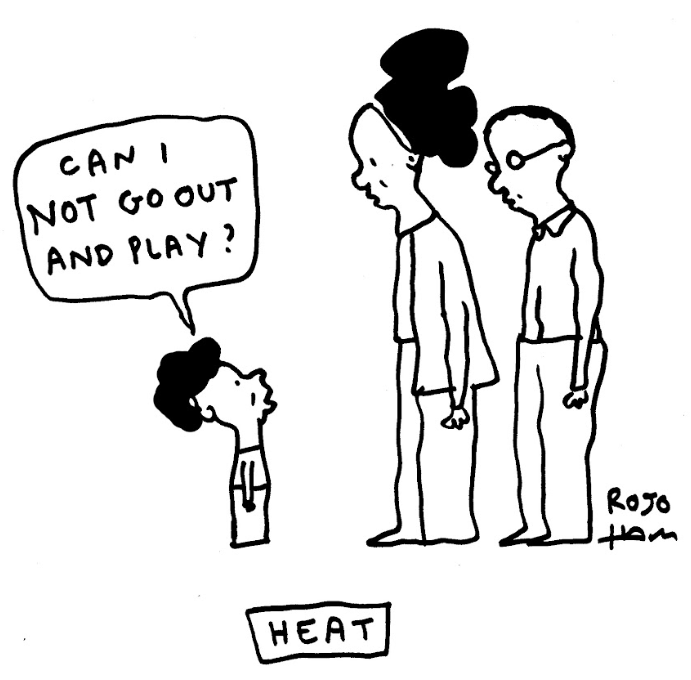
This category focuses on pathways and mechanisms by which climate change worsens mental health outcomes. However, understanding these pathways and mechanisms can also inform action to protect mental health. For example, breakdown of communities and social isolation can act as a pathway through which climate change worsens mental health, whereas building strong communities and social cohesion is a pathway that interventions can act on to protect mental health.
High-Level Research Category Three: Mental health benefits and risks of climate action

The term ‘climate action’ is defined here as actions to reduce the impact of climate change on human or natural systems, which may include either or both mitigation and adaptation (refer to Glossary). Climate action can happen across global, regional, national, local, community and individual levels and across sectors (e.g. as part of processes such as the UN Climate Change Conference COP (Conference of Parties), national climate mitigation and adaptation plans (Nationally Determined Contributions and National Adaptation Plans), decarbonising housing or transport systems, disaster preparedness, collective action in schools or workplaces, individual actions to reduce carbon footprints, activism etc.).
| Table 3: Priority research topics and questions within high-level research category three | |
|---|---|
| Priority Research Topic | Priority Research Questions |
| 3.1 Benefits and risks of climate action for mental health challenges (including identifying, understanding and quantifying these effects) | 3.1.1 Climate mitigation: What are the potential benefits and risks to mental health of different climate mitigation policies and actions at individual, local, national, regional and global levels, and across sectors? E.g. transitions to renewable energy, increasing active transport, adoption of a plant-based diet, nature-based solutions. |
| 3.1.2 Climate adaptation: What are the potential benefits and risks to mental health of different climate adaptation policies and actions at individual, local, national, regional and global levels, and across sectors? E.g. adoption of drought-resistant agricultural practices, strengthening community-level support, increased tree cover in cities. | |
| 3.2 Governance mechanisms to integrate mental health considerations into climate policies and actions | 3.2.1 Community involvement and leadership in climate action: How can community involvement and leadership in climate change-related decisions facilitate the integration of mental health into climate action? E.g. impact on awareness, uptake and efficacy of climate policies that have co-benefits for mental health. What are the benefits and risks to individual and community mental health of involvement in climate action?  |
| 3.2.2 Transdisciplinary collaboration and knowledge sharing: How can collaboration and knowledge sharing across disciplines, sectors and communities support the development and implementation of climate actions that integrate mental health considerations, and vice versa? E.g. involving mental health policy experts in climate policy development and implementation. | |
| 3.2.3 Barriers and levers: What are the barriers and levers for integrating mental health considerations into climate action at all levels and across sectors, and vice versa? E.g. commercial and political power dynamics and siloed structures which may reduce integration, growing interest and awareness in the climate change and health intersection. | |
| 3.2.4 Climate financing: What climate financing mechanisms are available or required to integrate mental health considerations into climate action at all levels and across sectors? E.g. leveraging public and private climate financing for mitigation and adaptation to benefit mental health outcomes, ensuring mental health is part of climate and health funding. | |
| 3.3 Motivating, enabling and sustaining climate action, particularly in ways that can support mental health | 3.3.1 Best-buy interventions for enabling co-beneficial climate action: What are the best-buy interventions at national and local levels to enable sustained climate action and transformative societal change that also strengthen or leverage good mental health? E.g. building widespread psychological resilience and agency, cultivating social capital.  |
| 3.3.2 Communication strategies: How can communication and information sharing strategies best report on climate change in ways that protect mental health and mobilise climate action that is co-beneficial for mental health? E.g. the media. | |
| 3.3.3 Awareness of mental health co-benefits: Does awareness of improved mental health as a co-benefit of climate action motivate individual, collective or political action, and/or does it increase public support for climate policies? |
High-Level Research Category Four: Mental health interventions in the context of climate change
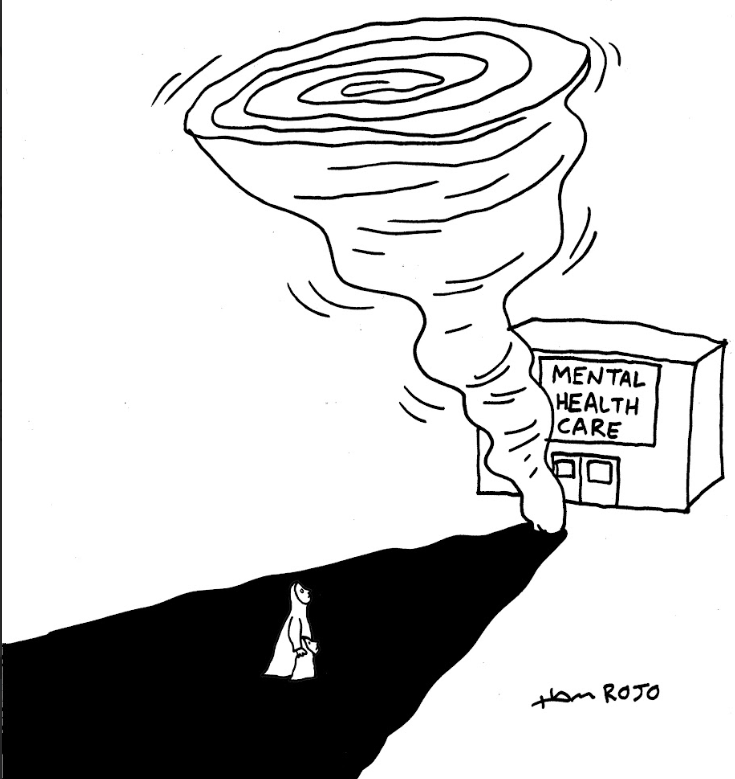
The term ‘interventions’ is used here as an umbrella term to capture responses, strategies, tools, resources, policies, practices or approaches aimed at addressing climate change-related mental health challenges. This includes both clinical and non-clinical mental health support, and positions mental health as embedded in community and wider systems, not just the individual.
| Table 4: Priority research topics and questions within high-level research category four | |
|---|---|
| Priority Research Topic | Priority Research Questions |
| 4.1 Current mental health interventions affected by or responding to climate change | 4.1.1 Existing interventions: What interventions exist to support climate change-related mental health challenges across sectors, disciplines, countries, cultures and communities, and how can these be rapidly evaluated, adapted and/or implemented across contexts? E.g. existing interventions in education or community settings, learning from Indigenous and traditional practices of mental health support, evidence-based psychological and pharmacological therapies. |
| 4.1.2 Climate change-related influences on intervention access, suitability and efficacy: What are the consequences of climate change and associated mental health needs on the accessibility and suitability of existing mental health interventions, and how are these being or will these need to be adapted to ensure continued access and efficacy? E.g. access to care, medication, workforce capacity, talking therapies, community-based support. | |
| 4.2 Community-led interventions to prevent and address climate change-related impacts on mental health challenges | 4.2.1 Community participation and leadership in climate change-related mental health support: What is the role and efficacy of community and peer participation and leadership in climate change-related mental health interventions? E.g. mental health post-disaster support provided through community health workers and peer support networks using task-shifting models. |
| 4.2.2 Behaviours, beliefs and attitudes: What individual and community behaviours, beliefs, spiritual systems, faiths, attitudes and practices influence the acceptability and efficacy of different climate change-related mental health interventions? How can this understanding appropriately inform intervention development, adaptation and delivery? | |
| 4.3 Capacity building and awareness raising of climate change-related mental health and interventions | 4.3.1 Capacity building: What are the capacity building needs of relevant actors to respond to climate change-related mental health challenges, and what are effective methods to build this capacity? E.g. with researchers across disciplines, policymakers across sectors, health providers, educators, communities. |
| 4.3.2 Awareness raising: What strategies effectively and appropriately raise awareness of climate change-related mental health challenges and available interventions? E.g. with researchers, research funders, policymakers, practitioners, educators and communities, through dissemination routes such as public health messages during heatwaves, working with the media, entertainment industry or with schools. | |
| 4.4 Identifying effective modes of delivery for mitigating mental health risks of climate change and responding to climate change-related mental health challenges | 4.4.1 Effective approaches for risk reduction and response across sectors: What are the evidence-based interventions for governments, health systems, educators and civil society to effectively mitigate climate change-related mental health risks and respond to climate change-related mental health challenges? How can these be effectively delivered? E.g. public health messaging, capacity-building programmes in community health centres.  |
| 4.4.2 New technology and low-technology approaches: What are effective and context-appropriate ways to deliver climate change-related mental health interventions using new technologies and/or low-technology approaches? E.g. telemedicine/online counselling, gaming, artificial intelligence products, low technological applications such as messaging applications, offline technologies and low data solutions. | |
| 4.5 Leadership, governance, and financing mechanisms for mental health interventions in the context of climate change | 4.5.1 Best-buy interventions for extreme weather and climate events: What are the best-buy interventions to implement before, during and after extreme weather and climate events to protect mental health and respond to climate change-related mental health challenges? What financing mechanisms are available or required to support their design, evaluation and implementation? E.g. evidence-based recommendations for prevention, preparedness, response and recovery (PPRR).  |
| 4.5.2 Transdisciplinary collaboration and knowledge sharing: How can experts across disciplines, sectors and communities effectively collaborate, share knowledge, co-create and implement mental health interventions appropriate for climate change at local, national, regional and global levels? E.g. Community of Practice platforms to share best practice, interventions developed by lived experiences experts. | |
| 4.5.3 Frameworks and governance structures: What existing and new policy frameworks and governance structures can facilitate the development and implementation of mental health interventions appropriate for climate change? E.g. leveraging disaster response, National Adaptation Plans, Nationally Determined Contributions. |
Application of the Global Research Agenda
Adapting global priority research topics and questions to local contexts
Application of the research agenda will vary across geographies, timescales and populations. Appendix 6 outlines 1) population groups, 2) mental health challenges and 3) extreme weather and climate events that were highlighted through the CCM process that priority research topics and questions should be applied to, and will need to be adapted to. This field is a nascent and highly dynamic research landscape; priorities for research will continue to evolve and be refined over time as the knowledge base builds, partly in response to this agenda, and as climate impacts are experienced in new and changed ways.
Applying the research agenda will also require bringing together expertise across relevant disciplines, either to learn from existing knowledge held in these disciplines or to generate new transdisciplinary knowledge. Figure 5 outlines illustrative examples of research questions/themes that require understanding from mental health research, from climate change research, and that are unique to the intersection.
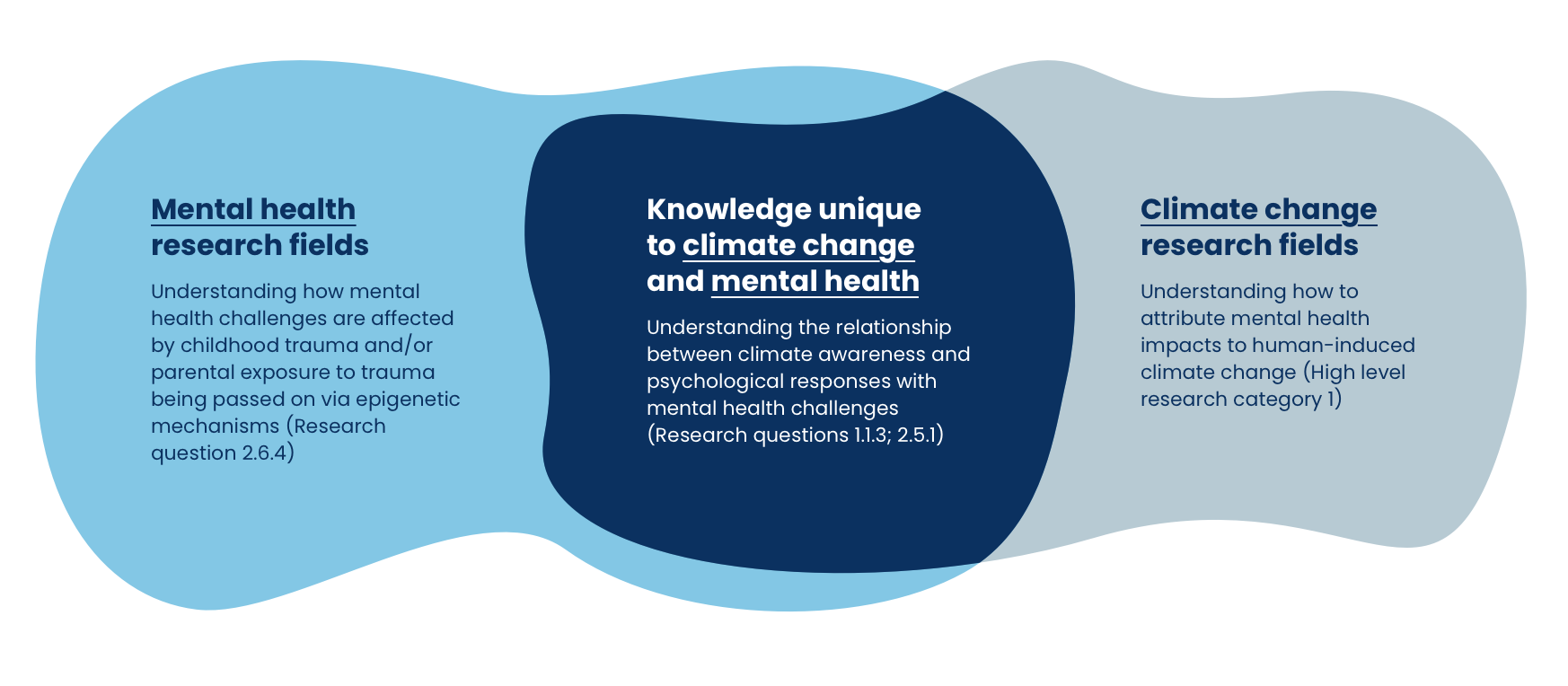 Figure 5: Example research questions that require understanding from mental health research, from climate change research, and that are unique to the intersection.
Figure 5: Example research questions that require understanding from mental health research, from climate change research, and that are unique to the intersection.
- 1.2.5 has been identified as a separate research question from 1.2.1 and 1.2.2 because long term impacts were strongly emphasised as a particularly understudied area of research in climate and mental health.
- Topic 2.7 has been presented last for clarity, see Appendix 5 for true ordering based on the number of Connecting Climate Minds research and action agendas in which each research question was raised.
- Kumar P, Brander L, Kumar M, Cuijpers P. Planetary Health and Mental Health Nexus: Benefit of Environmental Management. Ann Glob Health. 2023;89:49.
- Charlson F, Ali S, Benmarhnia T, Pearl M, Massazza A, Augustinavicius J, Scott JG. Climate Change and Mental Health: A Scoping Review. International journal of environmental research and public health. 2021;18(9), 4486. https://doi.org/10.3390/ijerph18094486=
- Charlson F, Ali S, Augustinavicius J, Benmarhnia T, Birch S, Clayton S et al. Global priorities for climate change and mental health research. Environ Int. 2022;158:106984.